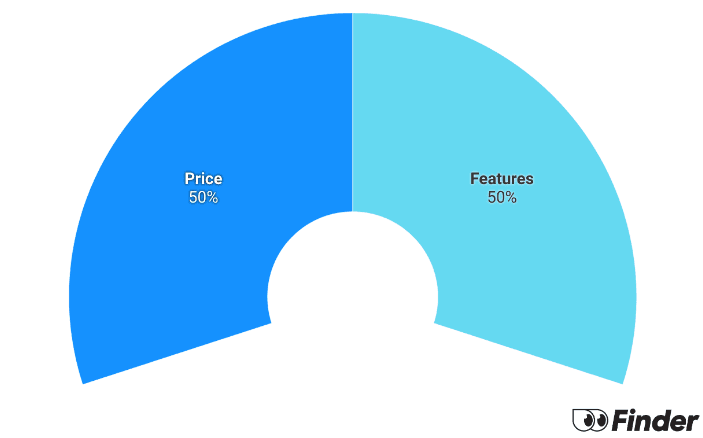Key takeaways
- Benefits for hearing aids are available on some mid- and top-tier extras policies.
- Hearing aids are not covered by Medicare, but the Australian Government Hearing Services Program provides them for some people.
- Extras cover for hearing aids starts from around $11 a week.
Compare health insurance for hearing aids
Here are some policies from Finder partners that cover hearing aids. They all have either a 12 or 36 month waiting periods, and most let you claim once every 3 years. All prices are based on a single individual with less than $101,000 income and living in Sydney.
Finder Score - Health Insurance Extras
Each month we analyse over 10,000 extras insurance products and rate each one on price and features. What we end up with is a nice round number out of 10 that helps you compare extras cover a bit faster.
We want to compare apples to apples, not apples to apple pie. It doesn't make sense to compare a top extras policy with coverage for hearing aids and braces against a policy designed only for dental. So we've separated all the extras policies on the market into pools and categories. Once in their pools and categories, each product gets a price score and a features score, which are then combined to give the Final Score.
How does private health insurance cover hearing aids and audiology?
Many private health insurance funds will include hearing aids and audiology on their extras policies. You'll generally need to be on a mid- or top-tier extras policy in order to be covered.
Private health insurance and hearing aids
- Hearing aids are typically only covered by the highest level extras policies.
- Policies will typically pay a set cost, rather than cash-back rebates. This is because the cost of hearing aids can vary widely.
- Private health insurance generally pays out for a single device. However, most funds have a specified limit for how many times you can claim, such as one device every five years.
- Some health funds offer benefits for repairing damaged hearing aids.
Health insurance benefits for audiology
- Benefits will either take the form of cash-back offers, where you get a certain percentage of costs paid, typically 60-100%, or set costs such as $35 for each audiology session.
- Initial audiology consultations and diagnoses usually take longer than subsequent follow-up sessions. As such, set cost policies generally pay more for initial sessions and less for follow-ups.
How much do hearing aids cost?
A pair of hearing aids without insurance or subsidies will cost you between *$1,495 and $11,000. Here are a few prices from Australian audiologists:
- Attune Audiology says a pair of hearing aids cost between $2,000 and $11,000 a pair.
- The Specsavers in-house brand cost between $1,495* and $3,495 a pair.
- Specsavers also sells devices from Phonak and Signia for between $4,495 and $5,495 a pair.
A set of hearing aids that are well adjusted and looked after should last you between 3 and 6 years. If you only need a single hearing aid, it should cost you half the price of a pair.
*Most hearing aids priced at $1,495 per pair are the basic devices available free on the Australian Government Hearing Services Program, as this is the benefit offered on that program. These devices tend to be very basic, without modern features like adaptive noise reduction and adaptive directional microphones - you often get what you pay for. To get a pair of hearing aids with modern features, you should expect to pay at least $3,000 to $5,000 a pair.
Behind-the-ear vs In-the-ear devices
Most models of hearing aids are available in either an behind-the-ear or in-the-ear configuration. For most people behind-the-ear is the best choice: they offer more natural sound as they don't block the ear canal, they allows for better placement of multiple microphones so you get better sound separation, and they generally look more slick and hi-tech.
Typical hearing aid benefits from Aussie health funds
If you have an extras policy that covers hearing aids, then you can claim part of the cost of your device back from your health fund. The size of your benefit will depending on your extras policiy.
- Mid-tier extras: Some mid-tier extras policies (around $40 a month) have a small benefit for hearing aids, generally around the $500 mark.
- Comprehensive extras: Comprehensive extras policies (around $70 a month) have a larger benefit, typically around $800.
- Top extras: Top extras policies ($90+ a month) generally offer the highest benefits for hearing aids, often ranging from $1,000 to $2,000.
3 things you should know
Extras policies typically have a 12 or 36 month waiting period before you can claim on hearing aids, and a benefit is generally only available every 3 years.
Hearing aids benefits generally can't be claimed through HICAPS, so you'll need to pay the full cost of your hearing aids, then claim the benefit later.
Your health fund's benefit will normally apply to a pair of hearing devices, one for each ear. If you only need a single device, ask your fund if you'll get to the full benefit, or only half.
The Australian Government Hearing Services Program
While Medicare doesn't cover the cost of hearing aids or audiology services like hearing tests, certain people can get their devices paid for under the Australian Government Hearing Services Program (HSP). The HSP will cover the cost of a hearing test and a basic hearing aid every 5 years. To be eligible for the HSP, you'll need to be:
- A Pensioner Concession Card holder (A Seniors Health Card doesn't count)
- A Department of Veterans' Affairs Gold Card holder
- A Department of Veterans' Affairs White Card holder (with hearing specific conditions)
- A dependent of someone in the above categories
- A member of the Australian Defence Force
- Referred by the Disability Employment Services Program
You can check your eligibility on the HSP website. It's not the greatest site in the world, so you can also contact any local audiologist and they should be able to walk you through your options.
Frequently asked questions
Sources
More guides on Finder
-
Are vaccinations covered by health insurance?
While COVID-19 vaccinations are free in Australia, other vaccines with out-of-pocket costs can be covered by private health insurance with some extras policies.
-
Health insurance for chiropractic treatment
Get discounts on your chiropractic treatment with private extras cover.
-
Health insurance for remedial massage
Remedial massage can help ease pain from general wear and tear as well as specific injuries. This treatment isn’t covered by Medicare but is included in private health insurance extras cover. Find out how private health insurance can cover you for remedial massage therapy.
-
Health insurance for blood pressure monitors
Find out when blood pressure monitors will be covered by Health Insurance and what you stand to receive in a claim.
-
Travel vaccinations and health insurance
Before you travel it's crucial to protect your health from risks found in popular destinations. Learn how extras health insurance can help pay for them.
-
Health insurance for physiotherapy
Physiotherapy services can be beneficial at any life stage, so it could be worth considering and comparing extras health insurance that can cover the cost of this type of treatment.
-
Optical health cover
Optical health cover can ensure you get the care you need to protect your eye health. Compare health insurance policies with optical cover.
-
Health insurance for non-PBS pharmaceuticals
If you're wondering what pharmaceutical costs are covered by private health insurance, we've got a guide to health cover for non-PBS pharmaceuticals here.
-
Health insurance for laser eye surgery
finder.com.au explains how the private and public health system in Australia handles optical procedures and services.
-
Health insurance with gym benefits
This guide takes a look at private health insurance in relation to gym membership and other health-related services.


